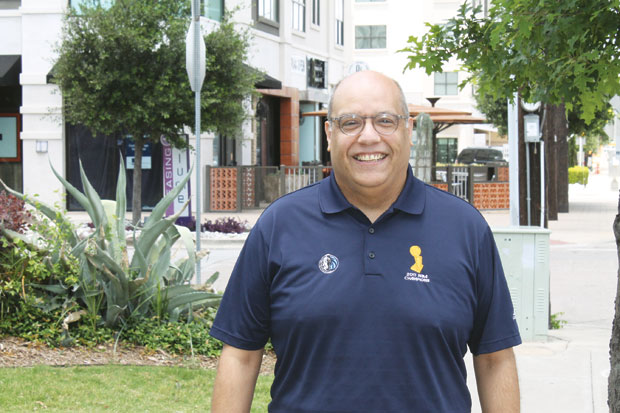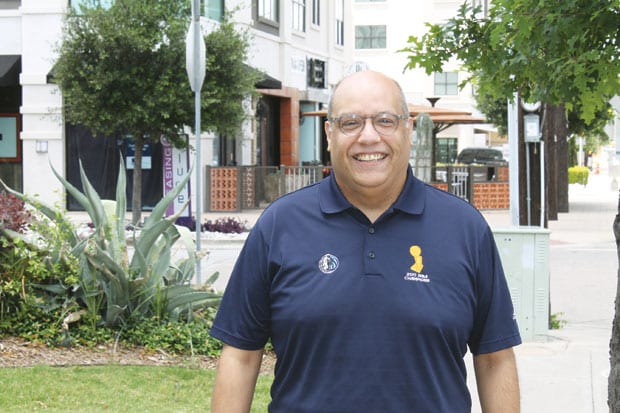Away from politics for 17 years, the former out city councilman returns to the limelight as diversity advocate

RETURN TO DISTRICT 2 | Former city councilman Chris Luna stands on ‘his’ side of Cedar Springs.
In 1991, redistricting divided the neighborhood down the middle of Cedar Springs, with District 2 on the southwest side and District 14 on the northeast. The intent was the ensure no gay person could get elected to Dallas City Council; instead, multiple gay candidates would be elected. (David Taffet/Dallas Voice)
If you weren’t in Dallas in the 1990s, Chris Luna’s name might not ring a bell, even though he was a trailblazer in local politics. First elected to Dallas City Council in 1991, Luna became one of several openly gay elected officials to serve on the council during the 1990s. When he left office in 1997 to return to his law practice, he stepped away from limelight.
In the last year, he married his partner of 18 years in New York and he was recently appointment to T-Mobile’s diversity committee. Other phone companies had perfect HRC Corporate Equality Index scores, and Luna helped T-Mobile raise its score to the same level.
During his first campaign for city council, Luna didn’t want to be known as “the out candidate.” Indeed, before committing to a run, he spoke to Resource Center Executive Director John Thomas and Dallas Gay and Lesbian Alliance President Bruce Monroe about keeping his private life private. He told them he’d never lie about who he was, that he’d never work against the LGBT community or do anything that would hurt it. But in a predominantly Hispanic district, he wondered: could he get elected as an openly gay man? The only person previously who tried to run as openly gay, Bill Nelson, failed in his attempt.
Thomas and Monroe agreed with the strategy. And while many in the media knew he was gay, they respected his privacy and waited for his coming out announcement. Luna went on to serve three terms on the Dallas City Council for District 2, two as deputy mayor pro tem.
The LGBT community likewise kept Luna’s secret in that first campaign. Luna said he decided that during his first term, he would provide excellent constituent services so that his sexual orientation wouldn’t matter in later elections.
When the city was redistricted into the current 14-1 plan, Oak Lawn was split in half. The intent was to ensure the LGBT community could never elect a gay or lesbian candidate. Instead, the plan backfired. By 1993, both Oak Lawn seats had gay councilmen when Craig McDaniel was elected to District 14.
Luna’s decision to come out was made for him, even if by accident. Just before the 1993 election, Luna attended the March on Washington, the historic rally in support of gay rights. Standing on the Mall in D.C. with the Dallas contingent, he didn’t expect to hear his name read from the podium near the Capitol among a list of gay elected officials at the march. But it was.
Reporters from Dallas respected Luna’s privacy on the issue, he said, and were waiting for him to “officially” come out. But “for some reason, the Houston papers picked up on it,” Luna said.
Knowing his father read the paper cover to cover each day, Luna changed his return plane ticket to Houston, so he could come out to his family in person.
“Their reaction was, ‘What took you so long to tell us? We always knew,’” he said.
Luna’s proudest memory of his three terms in office was the day the council passed a nondiscrimination policy for city employees. He said the smartest thing the LGBT community did was get a letter of support from civil rights pioneer Coretta Scott King.
“It basically said this is the right thing to do,” Luna said. “This is what Martin stood for.”
That gave black council members the cover they needed to stand up to pastors in the council chamber opposing the ordinance and vote for equality, Luna said.
After the vote, he remembered the crowds standing and in overflow room outside the council chamber and being congratulated and treated like a rock star.
For Luna, leaving the council was an economic decision. The pay at the time was low: $50 for attending a council meeting and $50 for a committee meeting — $100/week. He started up his law practice and has served on a number of boards in the interim, including the
Visitors and Convention Bureau, Parkland Hospital, the Dallas Zoological Society and AIDS Arms. Several years ago, he became legal director for Metro PCS and is its highest ranking Hispanic employee.
In 2013, that company merged with T-Mobile. While the two brands continue to operate separately, some functions have merged. Recently, Luna was appointed to T-Mobile’s diversity committee. “I’m very proud of that,” he said.
In addition to categories such as race and sexual orientation, the company is looking for people from across the country who are a variety of ages and hold a number of positions.
“Something that’s an issue to someone in a retail store might not be a problem for someone in upper management,” he said.
Luna is enjoying his current career, but could see eventually running for a county-wide office. Although always the optimist, Luna is practical when it comes to politics. He respects people who run for office so that entrenched incumbents don’t go unchallenged, but that’s not for him. He lives in Garland now where his state and federal representatives are Republican, so those positions aren’t options. But he’s keeping his options open.
“I have one more race in me,” he said. “But I see it as a capstone to my career.”
This article appeared in the Dallas Voice print edition June 20, 2014.

